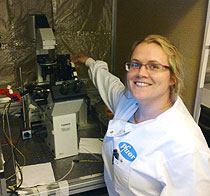Graduates and biopharma firms reap benefits of uni project
Release Date 21 October 2010

Graduates have been offered jobs and funding for future study after giving the regions' biopharmaceutical industries a boost during the tough economic climate.
Thirty highly-skilled interns have completed twelve-month or six-month placements in regional biopharma businesses as part of a project run by the Universities of Reading and Surrey. The interns have provided valuable support to companies across the region as well gaining work experience and guidance important for their future careers
So far, six interns have secured funding for PhD or MSc places, seven have been offered a permanent or contract role at their host companies, two have secured roles at other companies participating in the scheme, and a further two have joined other organisations.
The project, jointly funded by both institutions, the Higher Education Funding Council for England's Economic Challenge Investment Fund (ECIF) and the South East England Development Agency (SEEDA), aimed to address the immediate and long-term skills and knowledge needs of the biopharmaceutical industry in the region.
The internships have developed and retained skilled staff within the sector and forged even stronger relationships between the Universities and regional business. They have supported companies of all sizes in moving forward with projects in a time of recruitment freezes and challenging economic conditions.
Camille Soubrane has been working within the electrophysiology team in the genitourinary area of Pfizer in Kent. She will be starting a PhD in electrophysiology at the University of Reading, in collaboration with Pfizer, looking at mechanisms related to pain research.
She said: "I have really enjoyed my placement. Not only have I developed more technical skills but it has broadened my understanding of the drug-development process. Work experience in a large pharmaceutical company is a great advantage to get an interview and a graduate job."
Michael Postlethwaite, Camille's Supervisor at Pfizer, commented: "Camille's teamwork skills and proactive nature have actively progressed an important project destined for the clinic in early 2011. Not only has the project provided an excellent and highly competent team member for the duration of the placement, it has also allowed collaborations that were previously unavailable."
Noorma Jaumdally has secured a permanent role as an Associate Biostatistician at Quintiles in Bracknell. During her internship she benefited from personalized training and membership to the Royal Statistical Society. Noorma said: "Being part of the Reading-Surrey ECIF Project has enabled me to gain a better idea of the type of career path I would like to pursue."
Her supervisor Adam Web commented: "I think that the project had the right balance with regards to training and having sufficient time to develop new skills."
Reading's expertise and leading Knowledge Transfer Centre means the University, along with Surrey, enjoys a hugely successful relationship with industry which has proved to be instrumental in the success of the scheme.
In December, the University of Reading will publish a final report which will outline what the project has revealed about the preparedness of graduates for working in the biopharma industry, and make recommendations on how universities and industry can collaborate to improve skill and knowledge levels in new recruits.
The project findings will also feed into the work of the South East Universities Biopharma Skills Consortium, led by the University of Reading, which aims to support a thriving biopharma sector in South East England.
Ends
For all University of Reading media enquiries please contact James Barr, Press Officer tel 0118 378 7115/07788 714376 or email j.w.barr@reading.ac.uk
Notes to editors:
The project is a joint project with the University of Surrey and was awarded £689,185 under the Economic Challenge Investment Fund (ECIF). The Reading-Surrey ECIF project was set up by the Higher Education Funding Council for England (HEFCE) to help universities respond rapidly to meet the immediate needs of the economy during the current recession. The South East England Development Agency (SEEDA) offered match funding of £344,593 and the universities will each contribute £172, 296, bringing the value of the 18-month project to £1,378,371.
It offers clear, immediate benefits to participating business, universities and to current and prospective employees. The project is the first step in setting up a Centre for Knowledge and Skills Exchange for the Biopharma Industry in the South East, enabling ongoing dialogue and collaboration. Both universities look forward to a highly successful partnership that will bring huge benefits to the biopharma industry now, and in the future.
